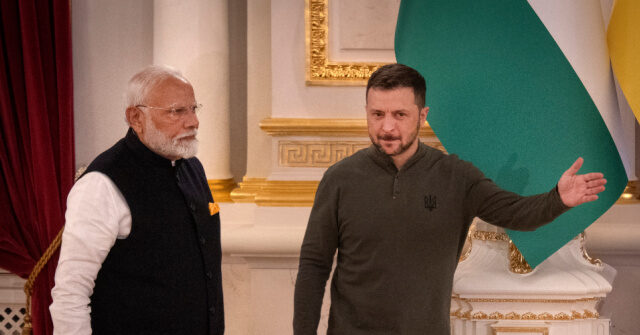In a recent interview with the Times of India, Ukrainian President Volodymyr Zelensky reached out to Indian Prime Minister Narendra Modi, emphasizing India’s potential role in influencing the resolution of the ongoing Russian invasion of Ukraine. Zelensky stressed that neutrality in this conflict is effectively complicity with the aggressor, urging Modi to utilize India’s significant economic power to pressure Russia. The president articulated his belief that Modi could be a vital actor in reversing the course of the war by blocking key aspects of the Russian economy, particularly in terms of energy resources and military supplies, stating, “This is the huge value of him in any conflict.”
Zelensky’s remarks come against the backdrop of a long-standing relationship between India and Russia, characterized by robust trade and military cooperation. India abstained from taking a decisive stance on the Ukraine war, often maintained amicable ties with Moscow, and increased its purchases of discounted Russian crude oil, capitalizing on the economic fallout from Western sanctions. Despite this, Zelensky lauded the size and influence of India, highlighting how the nation’s actions could significantly disrupt Russia’s war capabilities and potentially bring about an end to hostilities.
During the interview, Zelensky condemned Modi’s neutrality, suggesting that such a stance indirectly supports Russian invasion efforts. He forcefully declared that the Prime Minister’s position as the leader of a major global player should compel India to take concrete actions rather than merely expressing an interest in peace. Zelensky expressed confidence that India could leverage its substantial economic clout to diminish Russia’s ability to wage war, urging, “Put Putin in his place.” By reducing trade with Russia, particularly energy purchases, India could significantly weaken the Kremlin’s geopolitical leverage.
Zelensky also proposed the idea of India hosting a future “peace summit” to facilitate dialogue between Russia and Ukraine. He pointed out that previous efforts, including a summit organized in Switzerland, had fallen short due to Russia’s refusal to participate, thus precluding meaningful discussions. However, he emphasized that any mediation from India should respect Ukraine’s territorial integrity and be conducted under Ukraine’s terms. Zelensky expressed hope that India could play a crucial diplomatic role, potentially organizing discussions that would lead to resolutions benefiting both nations embroiled in the conflict.
India’s historical ties with Russia complicate its position in the Ukraine conflict. The Indian government has consistently refrained from imposing sanctions on Russia, citing longstanding relationships and mutual benefits from arms deals, energy supplies, and other trade agreements. Indian officials have often defended their approach in the face of Western pressure, arguing that they have their interests at heart and highlighting the selective nature of sanctions from countries that maintain their own energy dependencies on Russia. Indian External Affairs Minister S. Jaishankar articulated this sentiment, critiquing European nations for their hypocritical stance while continuing to import significant amounts of Russian oil.
Zelensky’s exploration of diplomatic channels with India underscores the growing complexities of international relations in light of the Ukraine conflict. As the war continues to unfold, and India navigates its longstanding ties with Russia while balancing its global positioning, it is evident that the stakes are high for both nations. Zelensky’s call to action seeks to galvanize a response from India that could reshape the dynamics of the war, urging Modi to recognize the critical importance of government actions in fulfilling the broader humanitarian goal of peace and stability in the region.

